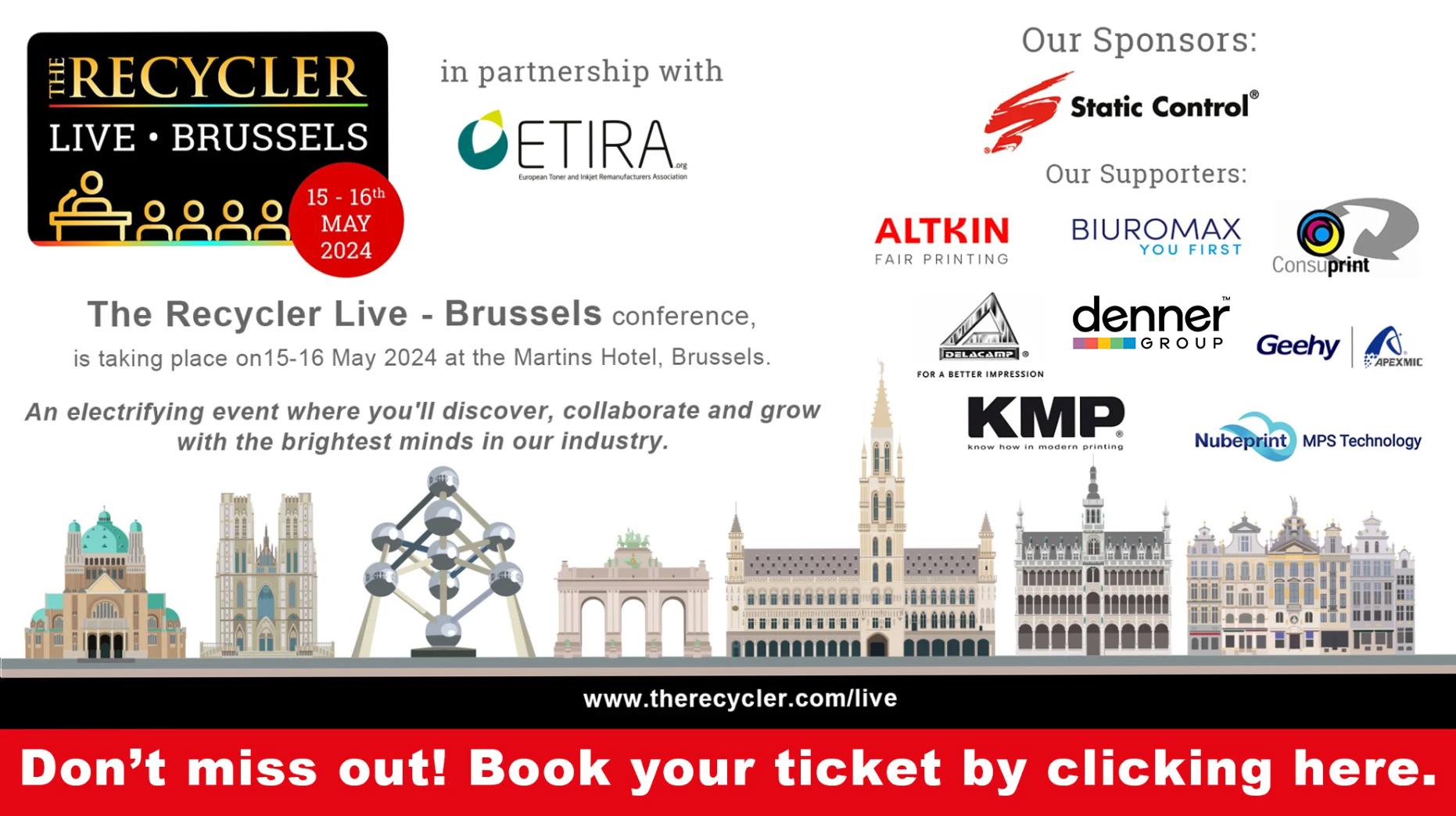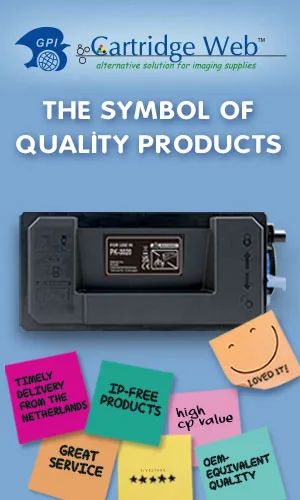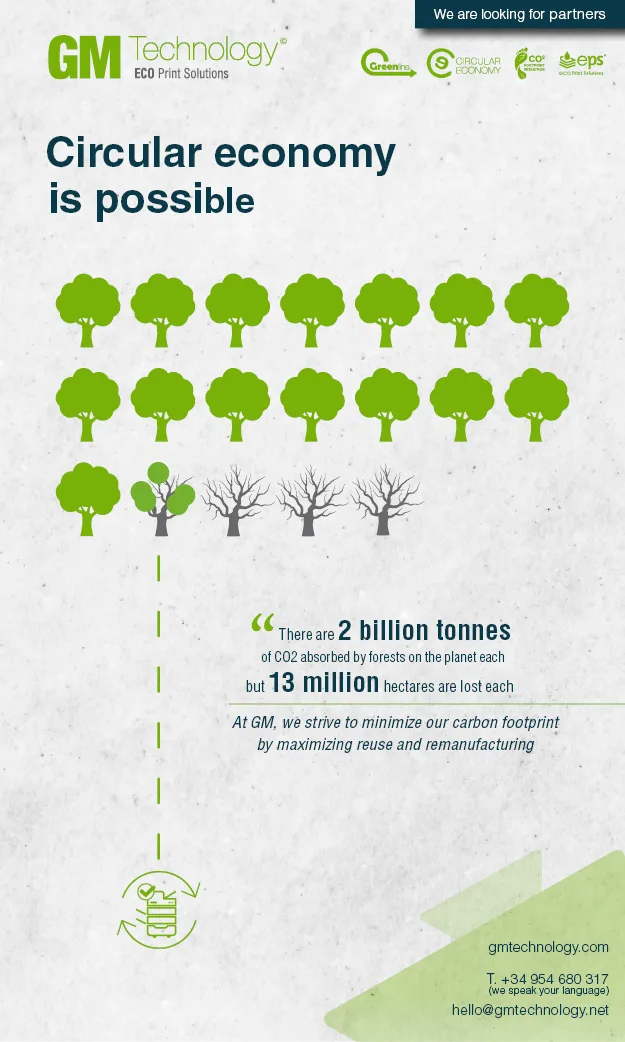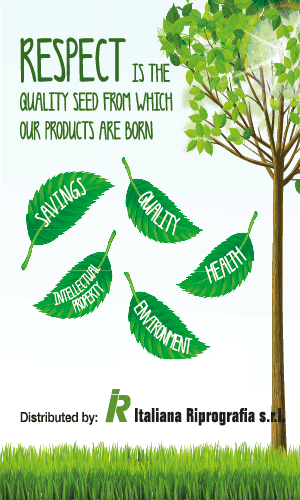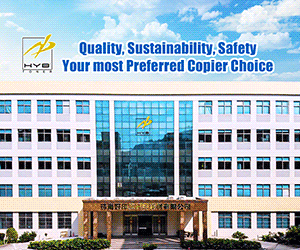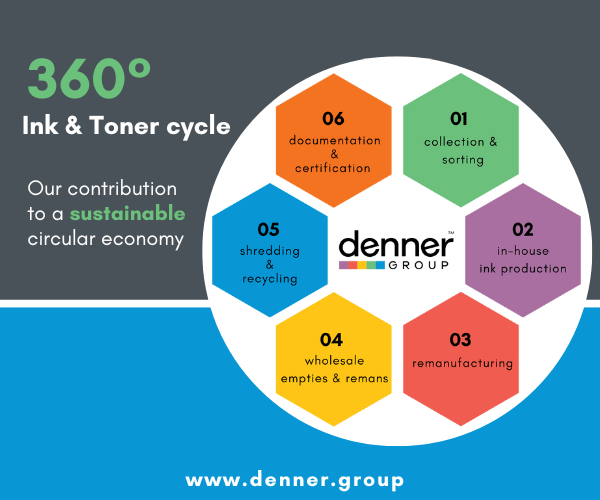Automation in remanufacturing: The cooperative approach?
July 12, 2021
 Nobody leaves school thinking I want to work in a factory remanufacturing toner cartridges. You would worry if they did. Yet over the next five years, the workforce will decline, and reuse will grow. If reuse is to be a growth activity in Europe, what needs to change?
Nobody leaves school thinking I want to work in a factory remanufacturing toner cartridges. You would worry if they did. Yet over the next five years, the workforce will decline, and reuse will grow. If reuse is to be a growth activity in Europe, what needs to change?
If you were building a factory from scratch, you would include as much automation as possible. Still, retrofitting automation has a host of problems, or does it?
Humans make several split-second decisions when sorting cartridges. Firstly, what cartridge is it, secondly is it damaged, thirdly is it needed urgently. It is not something you learn at university; it is an artisan skill learnt at the coal face of remanufacturing.
The European working population (aged 15 to 64) shrank for the first time in 2010 and is expected to decline year on year and well past 2050. At the same time, as the impacts of the European Green Deal kick in, there will be more printer related WEEE in the reuse channels until manufacturers produce less single-use and we reuse more.
A lack of affordable and scalable technology has pushed the European remanufacturing industry to rely on manual waste pickers to identify and extract high-value materials. Humans make several split-second decisions when sorting cartridges. Firstly, what cartridge is it, secondly is it damaged, thirdly is it needed urgently. It is not something you learn at university; it is an artisan skill learnt at the coal face of remanufacturing.
 In the current industry, remanufacturing will require more people to meet the growth in WEEE reuse processing. But people in the workforce will get scarcer, so salaries will have to increase, or the work moves out of Europe or automation replaces manual activities.
In the current industry, remanufacturing will require more people to meet the growth in WEEE reuse processing. But people in the workforce will get scarcer, so salaries will have to increase, or the work moves out of Europe or automation replaces manual activities.
To put that into context, in 2006, there were four people of working age (15 to 64) for each person aged 65 or over; by 2050, the ratio is projected to be just two people. As spending patterns change among older people, this creates a new demand for doctors, nurses, and health technicians and home-health aides, personal-care aides, and nursing assistants. This will lead to a decline in low-skilled manual workers in Europe.
Exporting activities outside of the EU will become more challenging. The ethos of the European Green deal is about reducing what we consume, reusing more and recycling everything else and creating valued work across Europe, not exporting it.
If you were building a factory today, you would include as much automation as possible. However, the factories are already built, and retrofitting automation can create a host of problems, from costs and people’s natural resistance to change. Couple this with the flawed belief that automation will replace human workers, and you’ve got a recipe for problems. Any level of automation needs buy-in from employees. The natural reluctance of employees towards automation is an issue to be overcome, not a reason to avoid automation.
Automation, robotics, artificial intelligence will be in demand, and the education sector is already teaching science, technology, engineering and mathematics, often referred to as STEM. But automation is historically expensive, and to date, there is limited use of technology in European remanufacturing. Whereas in China, automation is being introduced across the industry.
AI and robotics are now breaking into the waste management industry (let’s not forget that an empty cartridge is waste until…). FANUC, the Japanese factory automation specialist, has teamed up with intelligent waste management start-up Recycleye an AI-powered robotic waste-picking system.
Recycleye has combined its validated AI computer vision technology with FANUC’s 60+ years of experience in automation. To deploy and scale Recycleye Robotics, an AI-powered robotic waste-picking system.
Recycleye Robotics performs the physical tasks of identifying, picking and placing material at a rate of 55 successful picks per minute. The novel solution automates current manual operations and enables facilities to double their total throughput. FANUC’s team of expert automation engineers designed Recycleye Robotics to weigh 75% less than any existing robotic waste picker currently in the market. The plug-and-play installation eliminates traditional expensive retrofit costs.
Recycleye Vision powers Recycleye Robotics, an AI vision system, which has been deployed across the UK and French markets, exceeding human vision in identifying and classifying all items by material, object and even brand. Recycleye Vision works to constantly train and learn new object detection, enabling the robotic waste picking system to adapt to changing waste composition without manual upgrades.
The modular robotic picking system has been deployed at two UK material recovery facilities on multiple plastic and paper sorting lines. Deployments in France are scheduled for later this year. Having installed over 700,000 robots worldwide in different markets, FANUC will utilise their expertise to help lead the global rollout of the Recycleye robotic pickers. Recycleye and FANUC’s intelligent robotic system is creating a new wave of intelligent and affordable automation.
“While Recycleye’s technology has not yet been installed to pick toner and inkjet cartridges it certainly has the capabilities to do so.”
Yann Glauser, the Lead Hardware Engineer at Recycleye, added: “Recycleye’s intelligent robotic picker is creating long-term value for our clients, working consistently to increase throughput and reduce the cost of recycling. Our partnership with FANUC is leveraging world leading expertise in robotic solutions to develop the most effective automated solution for waste sorting.”
For the European remanufacturing sector to meet the future challenges of more printer-related WEEE in the reuse channels and fewer people in the workforce, AI and automation must be the option to replace the traditional artisan workforce.
Read more about automation in remanufacturing in The Recycler issue 345.
Categories : World Focus





